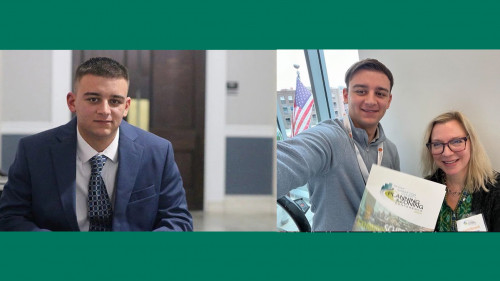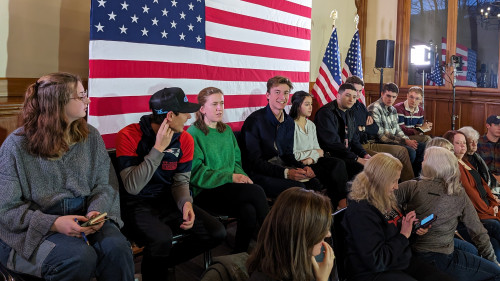
Showing Siena spirit while supporting fair trade? What’s not to like?
Mayan Hands is a collective of women artisans from the Guatemalan highlands – the poorest of the poor – who craft pine needle baskets, colorful scarves, felt toys and more to support their families. They already have a connection with Siena – their products are sold on campus during pop-up holiday shops and Roots Café lunches.
Like so many other businesses, though, the COVID-19 pandemic hit Mayan Hands hard. Their orders dried up as churches, colleges and craft fairs had to cancel sales. Wanting to help support the women in their work, three Siena students and their professor came up with an idea for a product that was sure to sell.
Vera Eccarius-Kelly, Ph.D., professor of comparative politics and president of the Mayan Hands board, and Jordan Dunn ’21, Rosie Hren ’21 and Michael Averill ’22, went to the Mayan Hands office in Albany in May to pitch their idea: green and gold Siena logo bracelets made from organic cotton. The artisans had crafted patterned friendship bracelets before, so introducing a new pattern was a relative cinch.
The results look awesome, and now the group has a new, but happy dilemma – how to market and sell a hit product.
“It’s a good problem to have!” said Hren.
The bracelets were introduced on campus on the October 7 Saints Day. Dyann Seravillo, assistant director of Student Activities and Leadership Development (SALD), said the bracelets were giveaways for those entering an Instagram contest that day. Student winners stopped by the welcome desk in the SSU to pick up their prizes, which got great feedback.
“It’s a neat partnership with Mayan Hands,” said Seravillo. “We’re always looking for new ideas for Siena-themed giveaways to promote school spirit and Franciscan values.”
The bracelets are selling for $5 each, and Dunn, Hren and Averill are exploring ways to share the word about the product, secure sales and get them to buyers. They stopped in at Siena’s Entrepreneurship Center to discuss options.
A new batch has been ordered from Mayan Hands; the shipment will arrive in December. They can be ordered by emailing veccarius-kelly@siena.edu or by responding to posts on social media. Orders of three or more bracelets will be mailed.
Dunn met with Central American artisans similar to those who craft for Mayan Hands on a Franciscan service trip to Nicaragua in March.
“The concept of women’s cooperatives is really close to my heart,” she said. “I want to do whatever we can to support their work.”
Eccarius-Kelly said one of the chief goals of the fair trade movement is to regularize household income. Once the women know they have a steady source of income, they can budget for their extended families, including school tuition, health care, home improvements and more.
Since the bracelets are already so popular, a toy Bernie dog made of felt could be the next Siena-themed product from Mayan Hands.
Averill will continue his support for Mayan Hands by working on a combined political science and Bonner capstone project through the end of his senior year. He’ll be conducting community asset mapping to address the needs of the various communities the cooperative works with throughout Guatemala, and he’ll study the root causes of emigration from the Northern Triangle Countries (El Salvador, Guatemala and Honduras).
"I hope to connect my community engagement work in Bonner with my studies in political science to educate the public on the root causes of mass migration from Central America such as extreme poverty, violence, and the devastating impacts of climate change on rural communities, he explained. “This work will also help advocate for how fair trade organizations such as Mayan Hands can act as a solution.”

